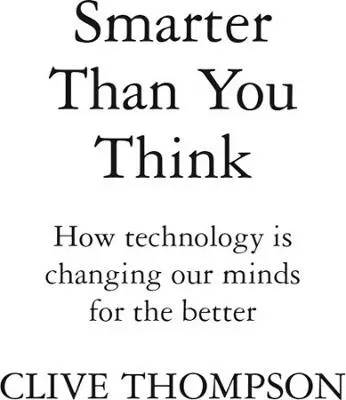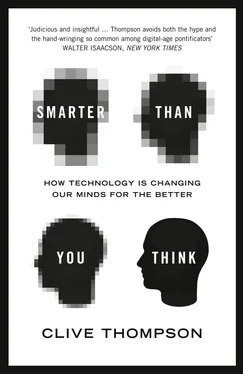

Copyright Contents Cover Title Page Copyright Praise Dedication The Rise of the Centaurs We, the Memorious Public Thinking The New Literacies The Art of Finding The Puzzle-Hungry World Digital School Ambient Awareness The Connected Society Epilogue Notes Index Acknowledgments About the Author About the Publisher
William Collins
An imprint of HarperCollins Publishers Ltd
77–85 Fulham Palace Road,
Hammersmith, London W6 8JB
WilliamCollinsBooks.com
First published in Great Britain by William Collins in 2013
Copyright © Clive Thompson 2013
Clive Thompson asserts the moral right to be identified as the author of this work
A catalogue record for this book is available from the British Library
All rights reserved under International and Pan-American Copyright Conventions. By payment of the required fees, you have been granted the non-exclusive, non-transferable right to access and read the text of this e-book on-screen. No part of this text may be reproduced, transmitted, down-loaded, decompiled, reverse engineered, or stored in or introduced into any information storage and retrieval system, in any form or by any means, whether electronic or mechanical, now known or hereinafter invented, without the express written permission of HarperCollins.
Source ISBN: 9780007427796
Ebook Edition © September 2013 ISBN: 9780007427789
Version: 2014-09-06
From the reviews of Smarter Than You Think: Contents Cover Title Page Copyright Praise Dedication The Rise of the Centaurs We, the Memorious Public Thinking The New Literacies The Art of Finding The Puzzle-Hungry World Digital School Ambient Awareness The Connected Society Epilogue Notes Index Acknowledgments About the Author About the Publisher
‘We should be grateful to have such a clear-eyed and lucid interpreter of our changing technological culture as Clive Thompson. Smarter Than You Think is an important, insightful book about who we are, and who we are becoming’
Joshua Foer, New York Times bestselling author of Moonwalking with Einstein
‘Almost without noticing it, the internet has become our intellectual exoskeleton. Rather than just observing this evolution, Clive Thompson takes us to the people, places and technologies driving it, bringing deep reporting, storytelling and analysis to one of the most profound shifts in human history’
Chris Anderson, author of The Long Tail
‘There’s good news in this dazzling book: technology is not the enemy. Smarter Than You Think reports on how the digital world has helped individuals harness a powerful, collaborative intelligence – becoming better problem-solvers and more creative human beings’
Jane McGonigal, author of Reality is Broken
‘Thompson has started an important debate in this lively and accessible book’
Scotsman
Dedication Contents Cover Title Page Copyright Praise Dedication The Rise of the Centaurs We, the Memorious Public Thinking The New Literacies The Art of Finding The Puzzle-Hungry World Digital School Ambient Awareness The Connected Society Epilogue Notes Index Acknowledgments About the Author About the Publisher
To Emily, Gabriel, and Zev
Contents
Cover
Title Page
Copyright
Praise
Dedication
The Rise of the Centaurs
We, the Memorious
Public Thinking
The New Literacies
The Art of Finding
The Puzzle-Hungry World
Digital School
Ambient Awareness
The Connected Society
Epilogue
Notes
Index
Acknowledgments
About the Author
About the Publisher
The Rise of the Centaurs_ Contents Cover Title Page Copyright Praise Dedication The Rise of the Centaurs We, the Memorious Public Thinking The New Literacies The Art of Finding The Puzzle-Hungry World Digital School Ambient Awareness The Connected Society Epilogue Notes Index Acknowledgments About the Author About the Publisher
Who’s better at chess—computers or humans?
The question has long fascinated observers, perhaps because chess seems like the ultimate display of human thought: the players sit like Rodin’s Thinker , silent, brows furrowed, making lightning-fast calculations. It’s the quintessential cognitive activity, logic as an extreme sport.
So the idea of a machine outplaying a human has always provoked both excitement and dread. In the eighteenth century, Wolfgang von Kempelen caused a stir 1with his clockwork Mechanical Turk—an automaton that played an eerily good game of chess, even beating Napoleon Bonaparte. The spectacle was so unsettling that onlookers cried out in astonishment when the Turk’s gears first clicked into motion. But the gears, and the machine, were fake; in reality, the automaton was controlled by a chess savant cunningly tucked inside the wooden cabinet. In 1915, a Spanish inventor unveiled a genuine, honest-to-goodness robot 2that could actually play chess—a simple endgame involving only three pieces, anyway. A writer for Scientific American fretted that the inventor “Would Substitute Machinery for the Human Mind.”
Eighty years later, in 1997, this intellectual standoff clanked to a dismal conclusion when world champion Garry Kasparov was defeated by IBM’s Deep Blue supercomputer in a tournament of six games. Faced with a machine that could calculate two hundred million positions a second 3, even Kasparov’s notoriously aggressive and nimble style broke down. In its final game, Deep Blue used such a clever ploy—tricking Kasparov into letting the computer sacrifice a knight—that it trounced him in nineteen moves. “I lost my fighting spirit,” 4Kasparov said afterward, pronouncing himself “emptied completely.” 5Riveted, the journalists announced a winner. The cover of Newsweek proclaimed the event “The Brain’s Last Stand.” 6Doomsayers predicted that chess itself was over 7. If machines could outthink even Kasparov, why would the game remain interesting? Why would anyone bother playing? What’s the challenge?
Then Kasparov did something unexpected 8.
The truth is,Kasparov wasn’t completely surprised by Deep Blue’s victory. Chess grand masters had predicted for years 9that computers would eventually beat humans, because they understood the different ways humans and computers play. Human chess players learn by spending years studying 10the world’s best opening moves and endgames; they play thousands of games, slowly amassing a capacious, in-brain library of which strategies triumphed and which flopped. They analyze their opponents’ strengths and weaknesses, as well as their moods. When they look at the board, that knowledge manifests as intuition—a eureka moment when they suddenly spy the best possible move.
In contrast, a chess-playing computer has no intuition at all. It analyzes the game using brute force; it inspects the pieces currently on the board, then calculates all options. It prunes away moves that lead to losing positions, then takes the promising ones and runs the calculations again. After doing this a few times—and looking five or seven moves out—it arrives at a few powerful plays. The machine’s way of “thinking” is fundamentally unhuman. Humans don’t sit around crunching every possible move, because our brains can’t hold that much information at once. If you go eight moves out in a game of chess, 11there are more possible games than there are stars in our galaxy. If you total up every game possible? It outnumbers the atoms in the known universe. Ask chess grand masters, “How many moves can you see out?” and they’ll likely deliver the answer attributed to the Cuban grand master José Raúl Capablanca: “One, the best one.” 12
Читать дальше














